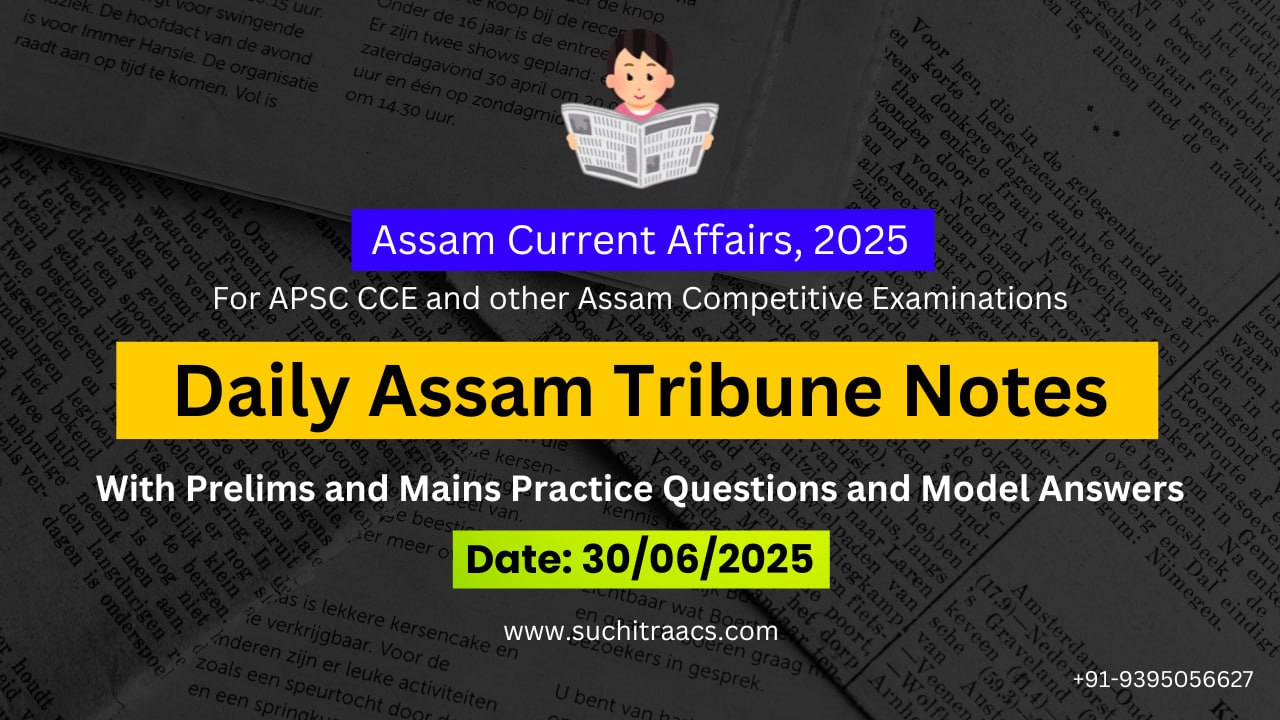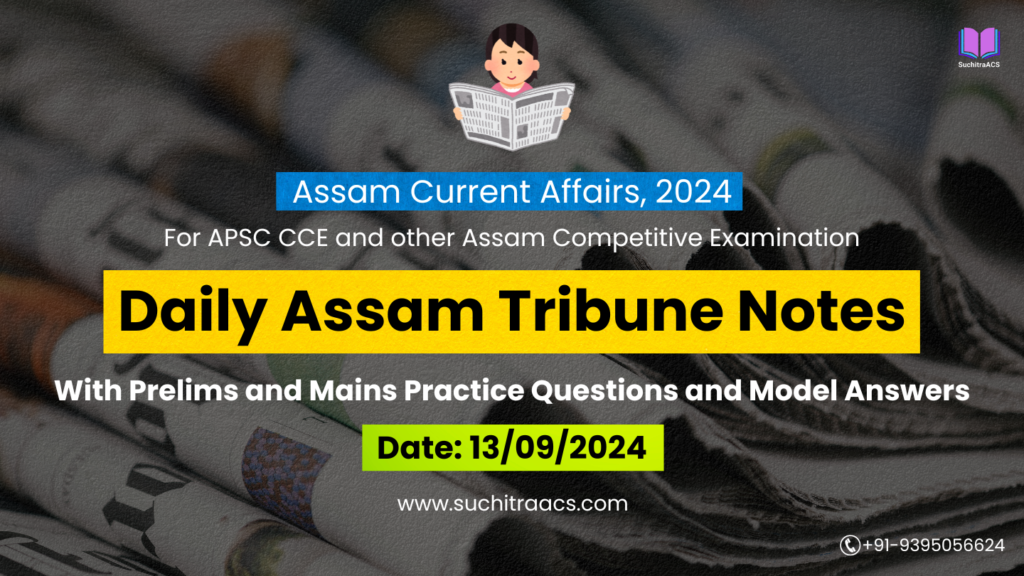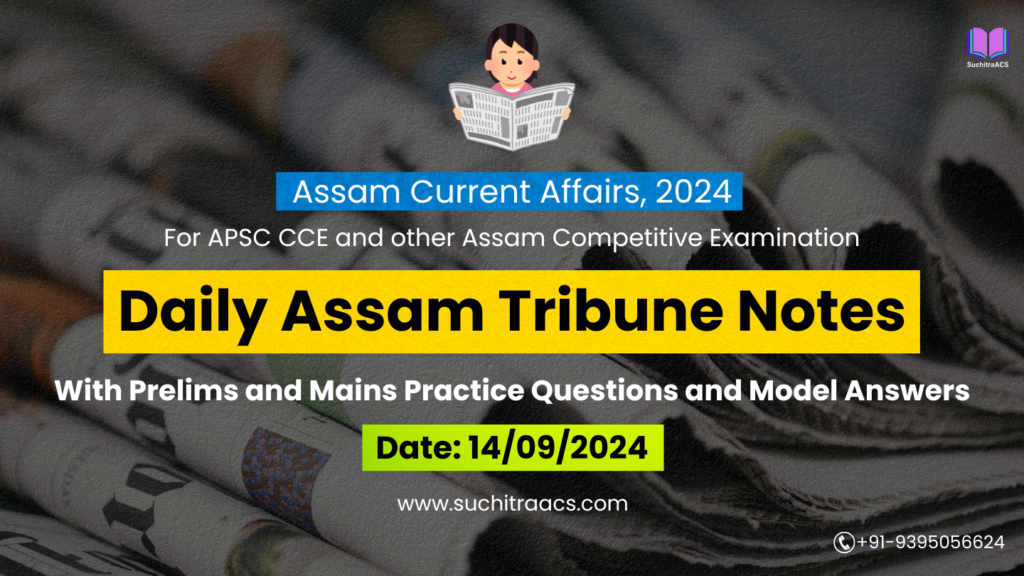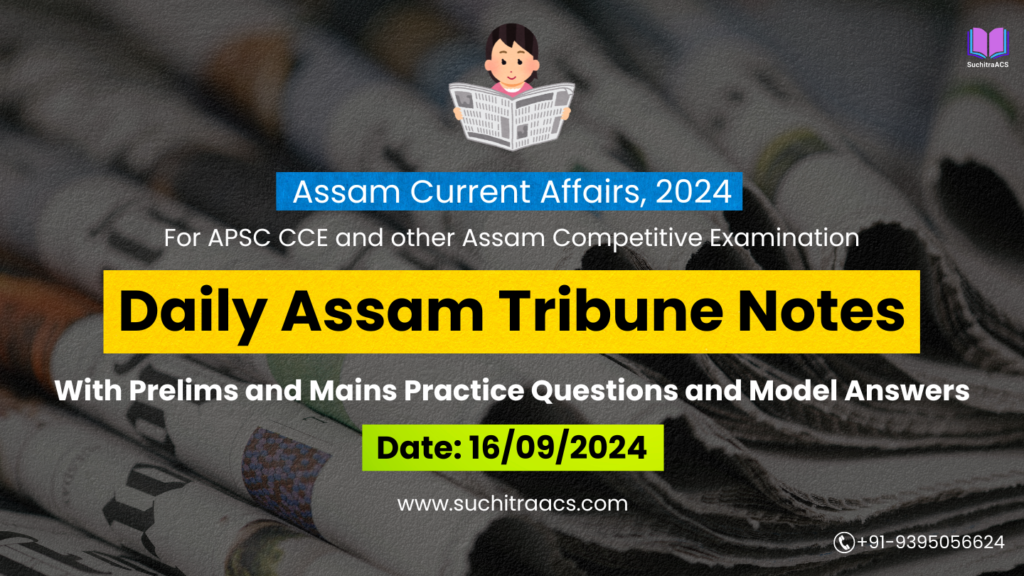APSC Current Affairs: Assam Tribune Notes with MCQs and Answer Writing (30/06/2025)
For APSC CCE and other Assam Competitive examinations aspirants, staying updated with current affairs is vital. This blog covers most important topics from the Assam Tribune today (30-06-2025). These issues are key for both APSC Prelims and Mains preparation, offering insights into the APSC CCE Syllabus.
✨ APSC CCE Online Coaching, 2026

✈️ NE’s First Highway-Based Emergency Landing Facility: Boost to Security & Disaster Readiness
📘 GS Paper 3: Infrastructure | Disaster Management | Internal Security
📘 GS Paper 5 (Assam): Regional Connectivity | Strategic Infrastructure in Assam
🔹 Introduction
For the first time in the Northeast, an emergency landing strip is being constructed on a national highway near Moran in Assam. Scheduled for completion by October 2025, this project marks a vital convergence of civilian infrastructure and national defence readiness.
🔑 Key Points
| Feature | Description |
| Location | 4 km stretch between Moran and Demow, Assam |
| Implementing Agency | NHIDCL (National Highways & Infrastructure Development Corporation Ltd) |
| Collaborating Body | Indian Air Force (IAF) |
| Purpose | Emergency landing for both civilian and defence aircraft (e.g. Sukhoi, Rafale) |
| Additional Proposals | Similar strips at Barama (Lower Assam) and Lumding (Central Assam) |
| State Involved | Assam (CM Himanta Biswa Sarma monitoring) |
| Strategic Features | To aid during floods, disasters, national emergencies |
⚙️ Strategic & Developmental Significance
National Security: Boosts India’s air defence capabilities in the strategically important NE region.
Disaster Response: Serves as landing pads for rescue operations during floods or earthquakes.
Civilian Utility: Dual-use potential for chartered/emergency flights during road closures.
Regional Integration: Complements India’s Act East Policy and border infrastructure buildup.
🧠 Prelims Pointers
NHIDCL: PSU under MoRTH, responsible for highway construction in hilly and strategic areas.
First Emergency Strip: Built in Rajasthan (2021) on NH-925; now expanded in Assam.
Dual Use Infrastructure: Facilities designed for both civilian and military use.
Sukhoi Su-30MKI: India’s frontline air superiority fighter, stationed in Tezpur and Chabua.
📝 Mains Pointers
A. Importance
Enhances Defence Preparedness in NE border areas prone to China-related tensions.
Fills Infrastructure Gaps in aviation readiness, especially during extreme weather or war.
Demonstrates Centre-State Cooperation on sensitive security-linked infrastructure.
B. Challenges
| Challenge | Explanation |
| Land Acquisition | Delays due to ownership issues or environmental risks |
| Operational Coordination | Need for constant alignment between IAF and NHIDCL |
| Maintenance | Ensuring highway is airstrip-ready at all times |
| Risk of Misuse | Civilian encroachments or roadside development risks |
📊 Relevant Government Schemes & Policies
Bharatmala Pariyojana – For highway development with strategic and border-area focus
Disaster Management Act, 2005 – Encourages proactive infrastructure for response
Defence Infrastructure Development Fund (DIDF) – For dual-use infrastructure
🧭 Way Forward
Pilot Test & Air Show: Suggested during inauguration to demonstrate operational capability
Replication in Other NE States: Like Arunachal, Tripura where airbases are fewer
Disaster Protocol Mapping: Integrate these strips into SDRF & NDRF rescue strategies
Maintenance SOPs: Regular drills and audits by IAF-NHIDCL-State coordination bodies
🧩 Conclusion
The highway landing facility near Moran isn’t just a runway—it is a runway to resilience, signalling India’s growing intent to turn its infrastructure into multi-dimensional assets for security and public welfare.
🌍 Empowering Multi-Purpose Health Workers (MPWs) in Assam
📘 GS Paper 2: Governance – Health | Role of Civil Services | Welfare Schemes
📘 GS Paper 5 (Assam): Public Health Infrastructure | Grassroots Service Delivery
🔹 Introduction
In an important step toward inclusive healthcare, Assam has initiated discussions on training and empowering Multi-Purpose Health Workers (MPWs) to handle basic medical responsibilities, especially in underserved rural and tribal areas.
🔑 Key Points
| Feature | Description |
| Initiative Focus | Training MPWs for primary care, early diagnosis, and follow-up |
| Goal | Decentralize healthcare and reduce burden on doctors |
| Implementation Suggestion | Training through accredited medical colleges or public health centers |
| Target Areas | Remote, tribal, and flood-prone districts of Assam |
| Community Role | MPWs as trusted local health agents for first-contact care |
⚙️ Importance for Assam
Bridges Accessibility Gaps: Assam’s difficult terrain and shortage of rural doctors make MPWs vital.
Disaster Response: MPWs can provide emergency care during floods or epidemics.
Focus on Preventive Care: Early screening, immunization, maternal-child health services
Trust Factor: Locals often respond better to known MPWs than visiting doctors
🧠 Prelims Pointers
MPW (Multi-Purpose Health Worker): A trained health worker responsible for disease surveillance, vaccinations, health education, and first-aid.
Accredited Social Health Activists (ASHA): Work closely with MPWs in rural settings.
Ayushman Bharat – Health & Wellness Centres (AB-HWCs): Envision MPWs as key stakeholders in the delivery of basic care.
Indian Public Health Standards (IPHS): Lay guidelines for staffing of sub-centres and PHCs, including MPWs.
📝 Mains Pointers
A. Importance of MPWs
| Domain | Contribution |
| Public Health | Vaccinations, nutrition campaigns, sanitation awareness |
| Pandemic Response | COVID surveillance, testing, vaccine logistics |
| Maternal Health | ANC/PNC support, delivery referrals, family planning |
| Non-Communicable Disease (NCD) Control | Lifestyle counseling, BP/sugar monitoring |
B. Challenges
| Challenge | Explanation |
| Inadequate Training | Many MPWs lack structured, standardized instruction |
| No Legal Backing | Limited authority to conduct basic procedures or dispense medicines |
| Poor Career Pathways | Stagnant posts, low remuneration, limited recognition |
| Gender and Workload | Female MPWs often burdened with both professional and domestic responsibilities |
📊 Relevant Schemes & Frameworks
Ayushman Bharat (2018) – Focus on primary health through Health & Wellness Centres
National Health Mission (NHM) – Funds MPW hiring and rural health outreach
Assam State Health Policy – Envisions a community-participatory model for delivery
14th Finance Commission Grants – Tied grants to local bodies for healthcare workers
🧭 Way Forward
| Recommendation | Strategy |
| 🎓 Certified Training | State tie-up with AIIMS, RIMS, and nursing institutes |
| 💼 Role Expansion | Empower MPWs with legal authority to prescribe basic meds |
| 📈 Career Ladder | Promotions, allowances, and recognition at district level |
| 🧑💻 Tech Empowerment | Use mobile health platforms for reporting and guidance |
| 👥 MPW-ASHA-ANM Network | Create three-tier grassroots care delivery clusters |
🧩 Conclusion
Empowering MPWs is not just about delegating duties—it’s about building resilient, inclusive, and localized health systems. With strategic investment and institutional support, MPWs can become Assam’s frontline guardians of public health.
🌊 River Interlinking Proposal in Assam: A Strategic Water Management Debate
📘 GS Paper 1: Geography – Water Resources
📘 GS Paper 2: Governance – Centre-State Relations | Inter-State Coordination
📘 GS Paper 3: Disaster Management | Infrastructure | Environment
📘 GS Paper 5 (Assam): Regional Issues – Floods and Resource Utilization
🔹 Introduction
The proposal to include Assam in India’s river interlinking plan by diverting surplus water to drought-prone regions highlights a crucial debate: Can Assam’s flood-prone geography be part of a larger national water balancing strategy?
🔑 Key Points
| Feature | Description |
| National Context | Ken-Betwa Link Project already underway in MP-UP |
| Assam’s Inclusion Demanded | Advocated by stakeholders to divert surplus Brahmaputra water |
| Expected Benefit | Reduce flood damage in Assam and help drought-hit regions elsewhere |
| Strategic Need | Assam faces annual economic losses due to floods |
| Required Conditions | Inter-State coordination, ecological assessment, and displacement mitigation |
⚙️ Relevance to Assam
Flood Mitigation: Could reduce annual flood damage in districts like Dhemaji, Majuli, Barpeta.
Climate Adaptation: Part of broader water redistribution to address erratic rainfall.
Agricultural Security: Protects kharif crops and ensures post-flood rabi sowing.
Strategic Utilization: Instead of excess water flowing to Bangladesh, it can serve national interest.
🧠 Prelims Pointers
Ken-Betwa Project: First major river-linking project; includes Daudhan Dam and power canals.
NRLP (National River Linking Project): Aims to connect 30 rivers with 14 Himalayan and 16 Peninsular links.
Brahmaputra Basin: One of India’s largest floodplains, with erratic flow and siltation issues.
Water Surplus vs Deficit Basins: Assam (surplus); Rajasthan, MP, Maharashtra (deficit)
📝 Mains Pointers
A. Significance
| Area | Impact |
| Environmental | Can reduce erosion, waterlogging, and habitat loss during peak monsoon |
| Economic | Prevents crop damage, boosts hydropower and irrigation |
| Social | Protects tribal/rural communities in low-lying flood zones |
| Inter-State Equity | Shares excess with water-deficit states like UP, Rajasthan |
B. Challenges
| Challenge | Explanation |
| Inter-State Coordination | Requires water-sharing agreements, especially with NE & Bangladesh |
| Ecological Disruption | River engineering can impact fisheries, wetlands, biodiversity |
| Silt Management | Brahmaputra’s heavy silt load may choke link canals |
| Displacement | Risk of submerging land and livelihood without strong R&R |
📊 Relevant Government Frameworks
Jal Shakti Abhiyan – Catch the Rain Campaign
Environment Impact Assessment (EIA) norms for large hydro projects
Assam State Action Plan on Climate Change (SAPCC)
Brahmaputra Board – Central agency for flood control & basin planning
🧭 Way Forward
| Recommendation | Action Plan |
| 🔍 Feasibility Assessment | Commission a Brahmaputra-focused interlinking impact study |
| 🤝 Consensus-Building | Convene NE states, Bangladesh observers for long-term treaty |
| 🌿 Ecological Buffer Zones | Protect wetlands, ensure fish migration channels remain open |
| ⚖️ Legal Safeguards | Involve judiciary and community representatives in planning |
| 🚰 Pilot Link Testing | Try micro-linking surplus tributaries to drought-hit NE districts |
🧩 Conclusion
River interlinking in Assam can either be India’s boldest water diplomacy or a fragile ecological gamble. A data-driven, environment-sensitive approach is essential before engineering the rivers of the Northeast.
APSC Prelims Practice Questions
✅ Topic 1: Emergency Landing Facility on Highway in Assam
1. Which of the following agencies is responsible for building highway-based emergency landing strips in India?
A. Airports Authority of India (AAI)
B. Indian Air Force (IAF)
C. National Highways Authority of India (NHAI)
D. National Highways & Infrastructure Development Corporation Ltd (NHIDCL) ✅
🧠 Explanation:
NHIDCL, under the Ministry of Road Transport and Highways, is responsible for constructing highways in hilly, border, and strategic areas, including emergency airstrips in collaboration with the IAF.
2. Which of the following is India’s first operational highway airstrip?
A. NH-37 near Tezpur
B. NH-925 in Rajasthan ✅
C. NH-15 in Arunachal Pradesh
D. NH-31 near Patna
🧠 Explanation:
India’s first emergency landing airstrip was inaugurated in 2021 on NH-925 in Barmer, Rajasthan, allowing aircraft like the Sukhoi Su-30MKI and C-130J Super Hercules to land.
✅ Topic 2: Empowering Multi-Purpose Health Workers (MPWs) in Assam
3. What is the primary role of a Multi-Purpose Health Worker (MPW) in rural India?
A. Conducting major surgeries at PHCs
B. Overseeing legal health insurance claims
C. Delivering basic health services and disease surveillance ✅
D. Managing state-level hospital procurement
🧠 Explanation:
MPWs are trained health workers who deliver first-level healthcare, conduct surveys, implement vaccination programs, and serve as the public’s first medical contact in rural and remote areas.
4. Which of the following schemes emphasizes the strengthening of grassroots health infrastructure through MPWs and ASHAs?
A. PM Jan Dhan Yojana
B. Jal Jeevan Mission
C. Ayushman Bharat – Health and Wellness Centres ✅
D. Pradhan Mantri Kaushal Vikas Yojana
🧠 Explanation:
Ayushman Bharat aims to establish Health & Wellness Centres (HWCs) across India where MPWs, ASHAs, and ANMs play a critical role in preventive and primary care.
✅ Topic 3: River Interlinking Proposal in Assam
5. The National River Linking Project (NRLP) in India is aimed at:
A. Building inland waterway ports
B. Creating dams for power generation only
C. Connecting surplus and deficit river basins ✅
D. Developing transnational irrigation networks
🧠 Explanation:
NRLP is designed to connect rivers across India, transferring water from surplus basins (like the Brahmaputra) to deficit areas through canals, reservoirs, and pumping systems.
6. Which of the following rivers is involved in India’s first interlinking project?
A. Ganga–Yamuna
B. Godavari–Krishna
C. Ken–Betwa ✅
D. Teesta–Mahananda
🧠 Explanation:
The Ken–Betwa Interlinking Project is the first under implementation, aiming to transfer surplus water from the Ken River (MP) to the Betwa River (UP) for irrigation and hydropower.
7. The Brahmaputra River faces which of the following geographical and environmental challenges?
- Heavy siltation
- Frequent seasonal flooding
- Water scarcity
- High erosion of riverbanks
Select the correct code:
A. 1, 2 and 4 only ✅
B. 2 and 3 only
C. 1 and 3 only
D. All of the above
🧠 Explanation:
The Brahmaputra River is known for heavy silt load, high erosion, and seasonal flooding, but not water scarcity, as it is one of India’s most water-rich rivers.
APSC Mains Practice Question
📝 Mains Question:
Q. Emergency landing facilities on highways serve both civilian and strategic purposes. Examine their relevance in India’s northeastern region, and highlight the challenges in integrating civilian infrastructure with defence preparedness.
📘 Model Answer
Introduction
India’s growing emphasis on dual-use infrastructure is reflected in projects like the emergency landing facility near Moran, Assam, the first such initiative in the Northeast. These strips, built on highways, enable both civil and military aircraft to operate during crises, enhancing national security, disaster preparedness, and regional connectivity.
Significance in the Northeast
| Dimension | Relevance |
| 🛡️ Strategic Defence | Proximity to international borders (China, Myanmar, Bhutan, Bangladesh) demands rapid IAF deployment. |
| 🌪️ Disaster Management | Northeast is prone to floods, earthquakes—air access helps rescue, relief, and evacuation. |
| 🧑⚕️ Emergency Response | Can aid in medical evacuations and transporting aid to cut-off areas. |
| 🌐 Regional Integration | Complements Act East Policy and multimodal connectivity in remote districts. |
| ✈️ Aviation Inclusion | Facilitates temporary civilian flights where no airports exist (e.g., Lumding, Barama). |
National Strategy Context
- Bharatmala Pariyojana includes strategic road corridors
- IAF Emergency Airstrip Program initiated post-2020 (Galwan context)
- North East Special Infrastructure Development Scheme (NESIDS) supports such dual-purpose projects
- First highway landing strip: NH-925A in Rajasthan (2021) used for IAF drill
Challenges in Implementation
| Challenge | Explanation |
| 🚧 Civilian Encroachment | Risk of shops, parked vehicles, or local misuse in peacetime |
| 🛠️ Maintenance Complexity | Runway needs constant upkeep even when not in use |
| 🤝 Coordination Issues | NHIDCL and IAF need joint SOPs, time-sharing plans |
| 🌿 Environmental Impact | Clearing flat land in hilly, flood-prone areas can affect local ecology |
| 💸 Cost Justification | High capital cost for facilities that may be rarely used |
Way Forward
| Strategy | Recommendation |
| 📋 Protocol SOPs | Joint command drills for IAF–Civil Admin coordination |
| 🧭 Site Selection Criteria | Should prioritize disaster-prone or security-sensitive zones |
| 📡 Tech-Based Maintenance | Use of drones and sensors to monitor strip readiness |
| 🧑✈️ Civil-Military Use | Use for NDRF, medical flights, NE border logistics during peacetime |
| 📈 Public Awareness | Local campaigns to prevent misuse of the designated highway zone |
Conclusion
Highway-based airstrips in Assam symbolize India’s evolving approach to resilient, multi-functional infrastructure. As Northeast India gains strategic and economic prominence, such facilities serve as a bridge between national security and inclusive development, provided they are backed by planning, precision, and public participation.
✨ APSC CCE Courses, 2025-26 offered by SuchitraACS


🔔 Join Our WhatsApp Study Group!
For exclusive access to premium quality content, including study materials, current affairs, MCQs, and model answers for APSC CCE and other Assam competitive exams.
Click here to join: SuchitraACS Study WhatsApp Group
📚 Want to know more about SuchitraACS’s most affordable courses?
Click here to know more: SuchitraACS Courses for APSC CCE and Assam Competitive Examinations




